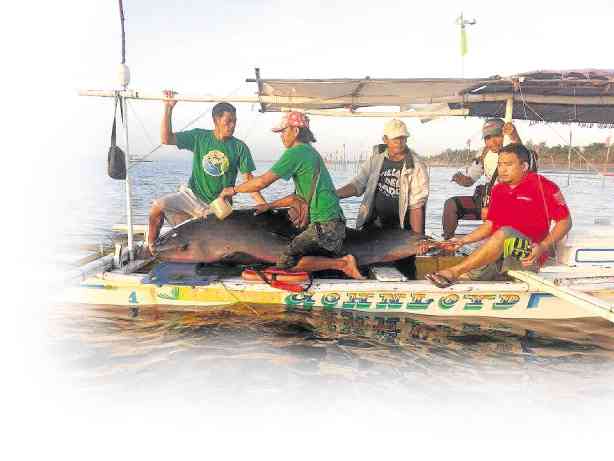
Fishermen and rescuers transport a pygmy sperm whale to a deeper portion of the sea in the town of Sariaya, Quezon province, after the whale continued returning to shore after it was found wounded by fishermen. CONTRIBUTED PHOTO
LUCENA CITY—Fishermen here found a 100-kilogram pygmy sperm whale (Kogia breviceps) stranded on the coast along Tayabas Bay in Sariaya town in Quezon province early Saturday, local fishery officials said.
Raffy Gosas, team leader of Sariaya Fishery Law Enforcement Task Force (FLETF), said the whale, which measures seven feet long, was discovered in shallow waters near the Villa Del Prado resort in Barangay Bignay 1 at 5:30 a.m.
The FLETF rescue team treated bruises on the whale’s body, fins and tail.
“We believe that the whale got entangled with a fishing net and escaped. That explains the bruises,” Gosas said by telephone.
When the team ensured that the whale was in good condition after an examination, the rescuers released the sea mammal to a deeper portion of the bay at 7:30 a.m.
The whale, however, swam close to the fishermen’s boat and accompanied them until they reached the shore.
The group brought the whale back to the bay aboard a motorized fishing boat and released it to a portion farther from the first location.
“We thought that the whale would swim back to the [deeper portion of the] sea but we were wrong,” Gosas said.
After a few minutes, he said his team received information that a whale was found stranded in the neighboring village of San Roque. Upon checking, they learned that it was the same pygmy sperm whale.
Gosas ordered the fishermen in the village to bring the whale back to another portion of Tayabas Bay, farther than the first two locations where it was released earlier.
The International Union for Conservation of Nature, in its website, said the pygmy sperm whale is protected under the US Marine Mammal Protection Act and the Convention on International Trade in Endangered Species of Wild Fauna and Flora.
Gosas recognized the help of fishermen, coastal villagers and beach resort operators in the protection of endangered marine species.
“They were all aware that catching and killing of endangered marine species is against the law and they have to be protected,” Gosas said.
Tayabas Bay off Quezon, Marinduque and Batangas provinces is also a sanctuary to endangered sea turtles, locally called “pawikan.”
The Sariaya coastline, host to many beach resorts and other tourist-oriented businesses, serves as a nesting ground for turtles that usually come to lay and hatch their eggs from October to December. Delfin T. Mallari Jr., Inquirer Southern Luzon

